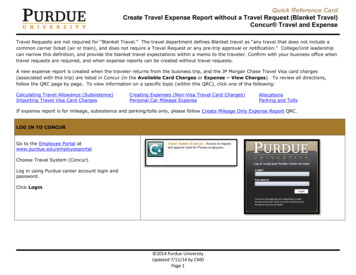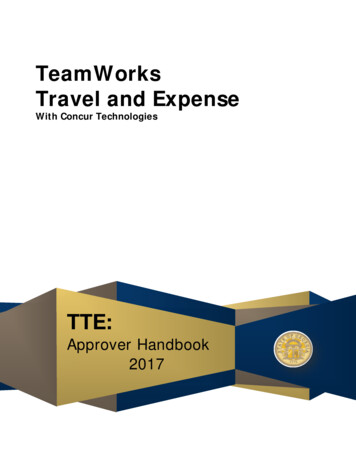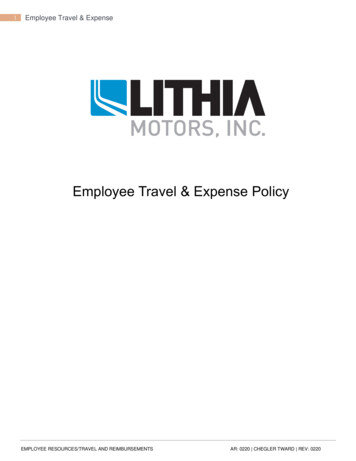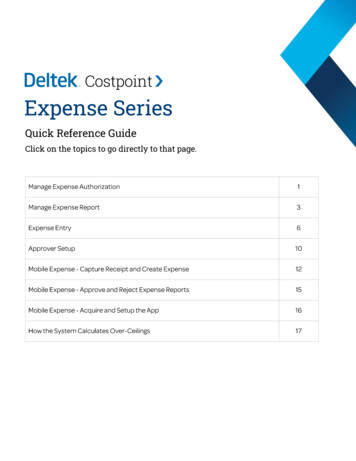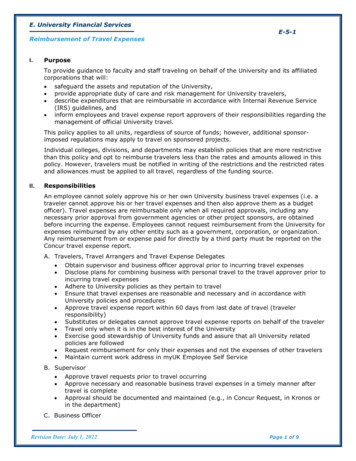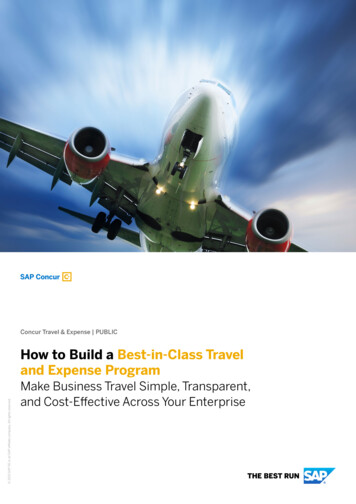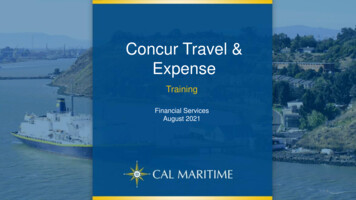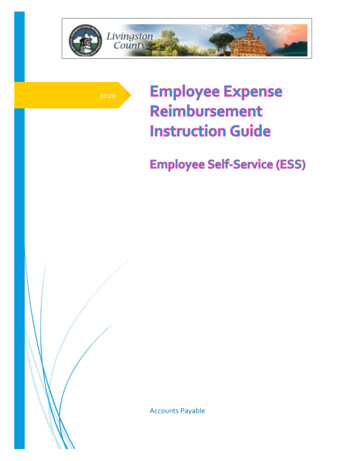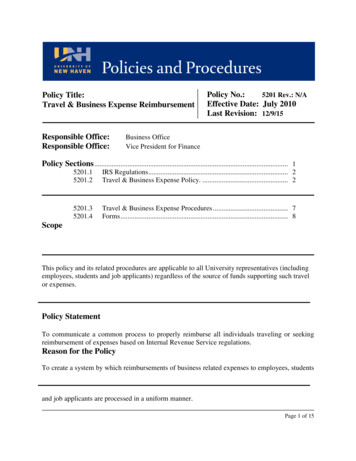
Transcription
Policy Title:Travel & Business Expense ReimbursementResponsible Office:Responsible Office:Policy No.:5201 Rev.: N/AEffective Date: July 2010Last Revision: 12/9/15Business OfficeVice President for FinancePolicy Sections . 15201.15201.2IRS Regulations . 2Travel & Business Expense Policy. . 25201.35201.4Travel & Business Expense Procedures . 7Forms . 8ScopeThis policy and its related procedures are applicable to all University representatives (includingemployees, students and job applicants) regardless of the source of funds supporting such travelor expenses.Policy StatementTo communicate a common process to properly reimburse all individuals traveling or seekingreimbursement of expenses based on Internal Revenue Service regulations.Reason for the PolicyTo create a system by which reimbursements of business related expenses to employees, studentsand job applicants are processed in a uniform manner.Page 1 of 15
DefinitionsAccountable Plan: Expense reimbursement or allowance arrangements are not considered taxableincome if they are made under an accountable plan as defined by the Internal Revenue Service.Under these rules, three tests must be met.1. Expenses must have a business connection to the employer.2. Expenses must be substantiated to the employer within a reasonable period of time.3. Any excess reimbursement or allowance must be returned within a reasonable time.Non Accountable Plan: Is a reimbursement or expense allowance arrangement that does not meetone or more of the three rules listed under Accountable Plans. In addition, excess reimbursementsnot returned to the employer and reimbursement of nondeductible expenses will be treated as beingpaid under a non-accountable plan. Reimbursements made under the non-accountable plan areconsidered taxable wages.Substantiation: Requires an employee to establish with adequate records such as receipts,account book, etc:1. The amount of the expense.2. The time and place of the expense.3. The business purpose of the expense.Policy Sections5201.1 IRS RegulationsIRS regulations allow employers the option of using either an "Accountable Plan" or a“Non Accountable Plan” for the reimbursement or payment of business expenses. It is inthe best interest of the University, its’ students and employees to operate under the“Accountable Plan”. Adherence to this policy will ensure the University is in compliancewith the IRS guidelines. The "Accountable Plan" must include requirements for propersubstantiation, a bona fide business connection and a timely return of amounts in excess ofexpenses. Reimbursements and Advances not meeting these requirements areconsidered taxable wages to the individual receiving the funds and UNH will berequired to withhold taxes on these amounts. Consequently, the University will onlyreimburse individuals for expenses which meet the requirements of an "Accountable Plan".University of New Haven PolicyPage 2 of 15
5201.2 Travel & Business Expense PolicyEmployees who need to travel should first seek approval from their immediatesupervisor. This must be done by completing a “Request of Travel & ConferenceAuthorization” form prior to incurring any expenses on behalf of the University. Anapproved Request for Travel & Conference Authorization is required when travelexpenses are anticipated to be 500 or greater. Travel arrangements should be the leastcostly, consistent with the itinerary and the business requirements of the trip.Grants (Sponsored Programs)University travel policy applies to all sponsored programs. However, if specific agencyguidelines for a sponsored program are more restrictive than University policy, then agencyrules shall apply. Individuals should be familiar with the specific cost allow abilityprovisions of their sponsored programs.When completing the travel authorization and/or the expense report form, please provide awritten explanation which justifies the benefits this expenditure has to a particular researchproject. The explanation should refer to a specific research project (grant speed key, granttitle, and how the expense is necessary in order to accomplish the goals of the specificgrant project).Any expenses that are to be charged to a grant must receive approval from the JillMarino Grants Department in the Business Office 203-932-7179 prior to incurring anyexpenses.Expense Reimbursement (Students)Undergraduate and graduate students may be reimbursed for expenses incurred on behalfof the University. Such reimbursements are not reportable to the IRS by the University asincome to the student, provided documentation is submitted indicating that the travel,entertainment or non-travel business expenses relate to:Official University business: A faculty member's project or research program; Presenting at a conference on behalf of the University (a photocopy of theconference program indicating the student is a speaker/presenter is required); or The student's employment at the University.Expense Reimbursement (Non-employees)In most instances, the University will reimburse non-employees (including job applicants,guest lecturers, and invited guests) for approved travel, entertainment and non-travelbusiness expenses incurred on behalf of the University. UNH requires that non-employeesprovide an adequate accounting of these expenses. To ensure the timely and accurateUniversity of New Haven PolicyPage 3 of 15
reporting of all University expenses, reimbursements should be submitted to the BusinessOffice within 15 days from the date of travel.Job applicants should complete an expense report for reimbursement for travel expensesincurred.PCard PaymentAll travel expenses must be paid for using a University of New Haven issued PCard. Useof a personal credit card is prohibited, Please contact the Business Office if you have notbeen issued a University of New Haven PCard.Booking TravelAll travel arrangements and bookings should be directed through the Purchasing TravelCoordinator who will ensure compliance with established discount programs and thispolicy.TransportationTravelers should try to find the most reasonable form of travel. The University willreimburse a traveler for reasonable airfare, car rental, taxi, bus and train fares. Receiptsmust be attached to expense report.AirfareReimbursement for all air travel will be at the lowest available rate – generally “coachclass”. Purchase of airfare with a University PCard is encouraged. Any difference in costfor class upgrade will be at the expense of the traveler. However, a traveler may choose totravel “business class” if the continuous flight time in the air (i.e. excluding layovers) (oneway from point of departure to destination – actual time in air) exceeds 6 or more hours.Supervisor approval is required for the purchase of “business class” airfare. (Example –two connecting flights, one 4 hours and one 3 hours would not qualify for business classbecause the total continuous time in the air is not 6 hours.)Car RentalOnly “Authorized Drivers” may rent a vehicle for University business purposes. An“Authorized Driver” is someone who successfully completes the University of NewHaven’s Driver Safety Program. Please also refer to Policy 5810 “Vehicle Use Policy”.The cost of a car rental is an allowable reimbursable expense provided that such an expenseis essential to the business trip. The University will reimburse the traveler the cost of thevehicle rental, based on the invoice paid to the rental company (IRS mileage does notapply). The traveler will also be reimbursed for any gasoline purchased separately that isnot included in the rental company's invoice provided an original receipt is attached to thereimbursement request. Every effort should be made by the traveler to rent cars from carrental companies that have discount agreements or special rates with the University. Pleasecontact the Business Office or Purchasing Department if you need help identifyingUniversity of New Haven PolicyPage 4 of 15
preferred rental car companies.Any rental of a vehicle for University business within the United States, Canada or PuertoRico SHOULD NOT include insurance through vehicle rental agencies. Insurancecoverage SHOULD be obtained when renting a vehicle outside the United States, Canadaor Puerto Rico.Rental of 12 and 15 passenger vans is prohibited due to the possibility of serious accidentsand injury to passengers. Please refer to Policy 5810 “Vehicle Use Policy”.RailStandard coach accommodations will be provided for rail travel less than six hoursduration. First class fare will not be allowed unless the continuous rail travel is more thansix hours in duration from station to station.Other TransportationReasonable use of taxis, buses, airport limousines and similar transport to and from theairport, hotel and/or conference sites will be reimbursed.Utilization of “Black Cars” or a personalized limousine service is prohibited.LodgingThe University will reimburse the traveler the lesser of the actual bill for the lodging or theper diem rate as listed in the GSA General Services Administration website.Personal MealsMeals consumed by an employee while traveling locally are not allowable businessexpenses according to the IRS. This does not include meals when an employee is diningor entertaining other individuals for business purposes.Business MealsIn situations where an individual is conducting business with one or more guests,reasonable meal expenses will be reimbursed. Business meals must be directly related toUniversity business. Participants in the business meal and the purpose of the business mealmust be documented on the expense report and on the original receipt.All Other ExpensesThe University will reimburse an employee or student for other necessary expenses(parking, tolls, registration fees, supplies) provided they relate to a bona fide universitypurpose and are supported by an original receiptUniversity of New Haven PolicyPage 5 of 15
Employees may purchase miscellaneous minor items (books, supplies, instructionalmaterials, etc.) and be reimbursed for their purchases.The University will not reimburse individuals for personal expenses while traveling suchas child care costs, kennel fees for pets, valet, laundry services, snacks, speeding tickets,parking fines, or other similar costs.Travel expenses for the spouse and/or families of faculty and staff will not be reimbursedby the University.Employees who attempt to circumnavigate the purchasing guidelines of the university bypurchasing items/services personally and then filing an expense report will be deniedreimbursement.Distinguished VisitorsThe University recognizes that certain invited guests may require upgraded travelarrangements. These arrangements will be an exception to policy and must be approvedin advance by the Associate VP for Finance or the Provost’s Office. Approved exceptionsmust be documented in writing on the expense report.5201.3Travel & Business Expense ProceduresRequest for Travel All employees are expected to obtain travel approval from their immediatesupervisor prior to incurring any expenses. availableATravelAuthorizationForm(ExhibitAandat http://www.newhaven.edu/academics/19261/) must be completed prior to travelif any of the following conditions exist:1. Travel where the estimated expense of the trip will exceed 500;2. Travel where any portion of the estimated expense of the trip will becharged to a sponsored (grant) program. The purpose of the Travel Authorization form is to capture the entire expenseassociated with a particular trip. The form must be signed and dated by theemployee and the appropriate financial manager. The approved form must besent to the Accounts Payable Office prior to making travel arrangements.University of New Haven PolicyPage 6 of 15
The approved total on the Travel Authorization Form will be encumbered to thedepartment upon receipt by the Accounts Payable Office. If the travel is to be charged to a grant, the form must be signed by Grants andContracts in the Business Office prior to submission to the Supervisor.Travel Advances Travel fund advances can be obtained by completing the “Travel Advance” form(Exhibit B). Travel advances are only available to employees and students of theUniversity and may be provided to travelers as deemed appropriate. Traveladvances cannot be issued more than 30 days prior to an event or the date of travel.Travel advance funds must be accounted for by completing an expense reportwithin 15 days of incurring an expense or from the last date of travel. The expensereport must document how the fund advance was spent including original receipts.The original receipts must include a hand written description of the reason for theexpense. Failure to follow these rules will result in the suspension of processing futureadvances and possible inclusion of these amounts as taxable income. The BusinessOffice has the final authority in approving or disapproving travel advances. Students who receive a travel advance and then do not complete an expense reportas required may have their financial aid reduced by the amount of the fundsadvanced.Business PurposeA clear and complete business purpose must be documented for each and every trip. Thepurpose should include the dates of the trip and enough supporting documentation to assistthe approver, and any subsequent reviewer, to validate the business need for the trip. Forexample, when attending a conference or other event on university business, supportingdocumentation (such as the conference brochure, itinerary or letter of invite), listing thedate(s) and purpose of the event, should be attached to the expense report.Expense Report (Exhibit C)Travelers are expected to submit an expense report to their supervisor with requiredsupporting documentation immediately upon incurring the expense or returning from thetrip.The Business Office must receive all expense reports within 15 days of incurring theUniversity of New Haven PolicyPage 7 of 15
expense or within 15 days from the last date of travel.International TravelExpense reports must be submitted in U.S. dollars with an explanation and translation ofthe foreign receipts and their conversions. Travelers must use the currency rates that werein effect when travel took place. Foreign exchange rates can be calculated at the ookup.cgiLodgingTo determine the maximum per diem rates that the University will reimburse, a travelermust use the GSA (General Services Administration) website. Please use the 1287Upon selecting a travel destination (State/City), the rates as provided in the GSA websiteare the maximum that will be reimbursed by the University. The traveler must include aprint out of the GSA website that shows the per diem amount for the traveling destination.The GSA calculations do not include tax. When completing the Travel Authorization form,please be sure to estimate the taxes due.However, when attending a conference, travelers may stay at the conference hotel eventhough it may not be the most economical option available.The University will not reimburse travelers for in room movies, mini bar snacks, roomservice or cleaning charges. The traveler must include a detailed copy of the hotel bill withthe expense report.Personal MealsMeals consumed by a traveler are reimbursable up to the maximum per diem rates ascalculated by the GSA. To determine the appropriate per diem rates, please use thefollowing GSA link:http://www.gsa.gov/portal/category/21287Upon selecting a travel destination (State/City), the rates as provided in the GSA websiteare the maximum that will be reimbursed by the University. To determine the breakout forbreakfast, lunch and dinner, the traveler should select the tab “FY10 M&IE Breakdown”.The traveler must include a print out of the GSA website that shows the per diem amountfor the traveling destination.University of New Haven PolicyPage 8 of 15
The University will reimburse travelers the lesser of actual bill for each meal or themaximum per diem rate for each meal as indicated in the GSA website. In either case, theactual receipts must be included in the expense report.When a traveler uses UNH funds or P-Card for meals, original receipts are required andshould be attached to the expense report and the PCard reconciliation report Receipts mustinclude hand written documentation of the business purpose for the expense.Travelers may be reimbursed for tips however, the combined cost for meals and tips arenot to exceed the established per diem rates.Foreign Travel ExpensesTravelers can use the US Department of State website to determine the per diem rates formeals and lodging in foreign countries.http://aoprals.state.gov/web920/per diem.aspBusiness MealsReceipts must be provided for business meals and the names of the business guests and thereason for the business meal must be documented in writing on the receipt. Meals withemployees, faculty, or staff are not considered business meals and are prohibited. Holidayparties, retirement parties, birthdays parties, etc. are not considered business meals and areprohibited.All Other ExpensesTo receive reimbursement for business meals and entertainment, the employee must attacha detailed receipt indicating the business purpose and must include a list with the namesof all persons attending the function. The specific business purpose of the expense mustbe described in the travel authorization form and/or the expense report and the originalreceiptRequest for reimbursement for other necessary expenses (parking, tolls, registration fees,supplies) must include a business purpose and must be detailed in the expense report andoriginal receipts must be included.Request for reimbursement for miscellaneous minor items (books, supplies, instructionalmaterials, etc.) must include a business purposes for the miscellaneous item. These itemsmust be detailed in the expense report and original receipts must be included .The University will not reimburse individuals for personal expenses while traveling suchUniversity of New Haven PolicyPage 9 of 15
as child care costs, kennel fees for pets, valet, laundry services, snacks, speeding tickets,parking fines, or other similar costs.Travel expenses for the spouse and/or families of faculty and staff will not be reimbursedby the University.Employees who attempt to circumnavigate the purchasing guidelines of the university bypurchasing items/services personally and then filing an expense report will be deniedreimbursement.Mileage – Personal Use of AutomobileTravelers must document each leg of their business trip and substantiate the miles traveled.Traveler should provide documented proof of the miles claimed with either amapquest.com print out or an odometer reading from their vehicle.Point of Origin and Final Return for TravelThe IRS provides standards that define the beginning and end of business travel. Thesestandards are useful in determining whether mileage from one's home or work office isto be used when reporting mileage for reimbursement. The “starting address” is the traveler's home or customary workplace, whichever islast visited before commencing the trip. The “destination address” is city and state in which the traveler is traveling to. The “return address” is the traveler's home or customary workplace, whichever isfirst visited after completing the trip. When travel begins or ends at the traveler’s home, reimbursement will be made forthe total miles driven, less traveler’s daily commute to the University. Travelers will be reimbursed at the standard mileage rate issued by the IRS. TheIRS mileage rate covers the cost of vehicle usage, including gasoline. The travelerwill not be reimbursed separately for gasoline expenses since it is included in therate. Travelers will be reimbursed for tolls and reasonable parking expenses that aredocumented in the expense report by an original receipt.UNH’s insurance does NOT provide physical damage coverage for damage to personalvehicles used for university business. Your personal automobile liability insurance isyour primary coverage when using your personal vehicle for university business.University of New Haven PolicyPage 10 of 15
Non-Reimbursable Items Airline club membership duesAirline upgradesAirfare, First ClassAir phone usageAlcoholic beverages of any kindAnnual fees for personal credit cardsAuto repairs for rental or personal vehiclesBaby-sitting or pet care servicesBarbers and hair salonsBirthday party expenses and giftsPersonal cell phone monthly feesCar rental insuranceClothing or toiletry itemsCorporate card delinquency fees or finance chargesClub memberships for business, pleasure or recreationExercise room fees or health club feesExpenses related to personal vacations or personal days taken before, during orafter a business tripGift CardsGift CertificatesGiftsGolf fees, ski lift tickets, spa charges, etcHoliday party expenses and giftsItems confiscated by airport securityIssuance of passport or passport renewalFrequent flyer upgradesLaundry chargesLoss or theft of airline/rail/bus tickets or any personal funds or propertyMeals where only a University of New Haven faculty or staff member is presentMedical expenses while travelingMini-bar itemsIn-room or in-flight movies or game rentals/on-demand orders“No-Show” charges for hotels or any other reservationsOptional travel or baggage insuranceParking tickets or traffic violationsPersonal entertainment, reading materials, or telephone callsRental car options such as LDW, CDW, PAI, liability, etc within the USRental car upgrades to premium and luxuryRetirement party expenses and giftsShoe shinesUniversity of New Haven PolicyPage 11 of 15
Souvenirs/personal gifts or evening wear rentalsSpouse/guest related charges while travelingTravel costs of an employee’s spouse or dependentsExpense Reports All expense reports must be submitted within 15 days of completing a trip or within15 days of incurring an expense. Failure to do so may result in denial ofreimbursement or the possible treatment of reimbursement as taxable income to theemployee. All expenses incurred on behalf of the University are to be certified as tocompleteness and accuracy by the traveler and are to be approved by their FinancialManager/Supervisor. The Accounts Payable Office will not reimburse a traveler any amounts whichexceed the total approved amount from the Travel Authorization Form. The Business Office will review the expense report to ensure compliance withUniversity policy and IRS Guidelines. All expenses incurred using a PCard must be documented separately byreconciling/reclassifying the PCard expenses, PCard expenses must also bedocumented on the expense report. No individual may authorize and approve his or her own travel expenses. If any portion of the expense report is charged to a grant, the traveler must securethe approval from the grants financial administrator (Grants Department in theBusiness Office 203-932-7179) prior to submittal to the Chairman/Supervisor. Amounts paid with a UNH PCard must be accounted for in the expense report. PCard users must still complete their P-Card reconciliation and submit the requireddocuments to the Purchasing Department in Part B. Amounts paid directly by the University – via accounts payable – must beaccounted for in the expense report in Part B. Travel Advances received by travelers must be accounted for in the expense reportin Part D. The Banner Index and account numbers must be filled out on the expense reportprior to submission to the Business Office.University of New Haven PolicyPage 12 of 15
On those occasions when personal travel is combined with business travel, theUniversity will not reimburse any expenses associated with the personal part of thetrip.TRAVEL INSURANCE Travel Accident Insurance and Travel Life InsuranceTravelers will not be reimbursed for costs associated with the purchase of TravelAccident Insurance or Travel Life Insurance. Faculty and Staff are covered by theUniversity’s blanket accidental death and dismemberment insurance while onapproved travel outside the community where they reside or normally work. Thisdoes not include commuting between home and normal work sites. Travel Cancellation and Rescheduling InsuranceThe University does not reimburse travelers for trip cancellation insurance. Travelinsurance should not be purchased.COMMERCIAL RENTAL VEHICLESTravelers driving in support of official University business must comply with theUniversity’s Vehicle Use Policy 5810. Policy No. 5810 requires completion of theUniversity of New Haven’s Driver Safety Program.The University's designated vehicle rental agency should be used whenever possible.Midsize, economy, compact or subcompact vehicles should always be rented.Reimbursement will be made for other types of vehicles in exceptional cases (e.g., severaltravelers are riding in one car, equipment being transported, etc.).Travelers should rent vehicles in the University’s name with the authorized traveler as thenamed driver. Under no conditions should the authorized traveler allow another person tooperate their rental vehicle.Travelers should not purchase a collision damage waiver (CDW) from the rental agency ifthe rental is in the U.S or Canada; coverage should only be purchased for internationalrentals.Travelers must report all accidents to the Department of Public and AdministrativeServices within 24 hours, and immediately when any accident results in any personal injuryor towing of a vehicle. The traveler should follow the rental agency accident reportUniversity of New Haven PolicyPage 13 of 15
instructions, in addition to forwarding a copy of the report to the Department of Public andAdministrative Services.TRAVEL TO HIGH RISK LOCATIONSTravel to foreign destinations should be checked online with the U.S. Department of Sate(https://step.state.gov/) to see if the location is at a “High Risk” or if there are any tripadvisories “cautions” prior to making any travel plans.Travel Authorization Requests must specify if the travel destination is considered HighRisk.The Director of Public Safety must be informed if a travel destination is considered HighRisk.Travel to High Risk locations should be reviewed by Associate Vice President or higherto determine if the trip should be authorized.Employees planning to travel abroad are encouraged to enroll in Smart TravelerEnrollment Program (S.T.E.P.). When you enroll in S.T.E.P. the State Department canupdate you with important safety and security announcements. By enrolling you willmake it easier for the embassy or consulate to contact you in the event of an emergency.Remember to keep your information in S.T.E.P. up to date. When you enroll or updateyour information include a current phone number and e-mail address.Prior to traveling make sure that you have contact information for the nearest U.S.Embassy or Consulate where you are going. Consular duty personnel are available foremergency assistance24/7.Travelers to foreign locations should make a copy of your passport, student visa (ifapplicable), driver’s license, ATM cards and credit cards (front and back), making note oftheir customer service numbers, including the number to call from abroad. Keep copies ina separate location from your wallet or purse. Also leave copies of all documents at homewith a family member. It is also a good idea to scan your passport and email it to yourselfand your family.This statement of policy and procedure is intended to be a guide in determining reasonableexpenses for University business expenses.University of New Haven PolicyPage 14 of 15
5201.4FormsThe following forms are online: Travel & Expense Reimbursement PolicyTravel Authorization FormTravel AdvanceExpense ReportExpense Report Continuation s seeking to be reimbursed must use the forms listed above. The use of any otherforms will not be accepted by the Business Office.University of New Haven PolicyPage 15 of 15
Non Accountable Plan: Is a reimbursement or expense allowance arrangement that does not meet one or more of the three rules listed under Accountable Plans. In addition, excess reimbursements not returned to the employer and reimbursement of nondeductible expenses will be treated as bei ng paid under a nonaccountabl- e plan.
